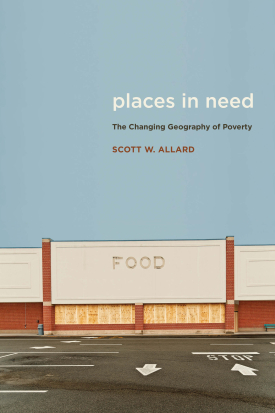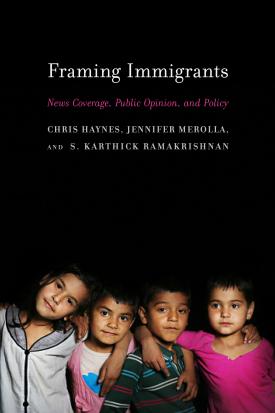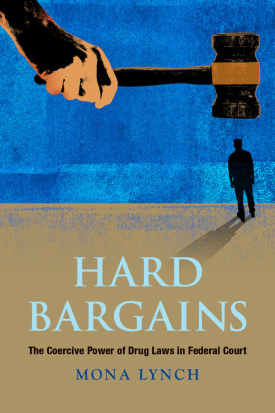
Places in Need
About This Book
“Scott W. Allard is one of the nation’s foremost experts on poverty, and Places in Need is a tour de force. This carefully-researched book offers more than innovative economic analysis and important lessons for social policy. It represents a deeply moral call to update our thinking about vulnerable people across America and rethink outdated assumptions about how to assist them. Places in Need must become required reading for anyone who seeks to understand modern American poverty, let alone begin to combat it.”
—Arthur Brooks, president, American Enterprise Institute
“Places in Need tells the story of how poverty has grown dramatically in suburban America due to displacement, immigration, and job loss and how the existing social safety net is ill-equipped to address this new challenge. Scott W. Allard’s analysis expertly marshals both quantitative and qualitative data to give a nuanced account of the difficulties of meeting social needs in suburban locales. His insights and policy recommendations should be carefully studied by policymakers and social service providers as they come to grips with this new reality.”
—Paul Jargowsky, Professor of Public Policy, Rutgers University, Camden
“An exceptionally rich book that astutely focuses on key current issues related to the geography of poverty in the United States and trends therein. Scott W. Allard’s analysis is impressive in both its breadth and depth. His insights regarding the implications of geographic location for anti-poverty policy—how best to support low-income individuals and families in urban, suburban, and rural areas—make Places in Need essential reading for scholars, policymakers, and policy practitioners alike.”
—Lawrence M. Berger, Vilas Distinguished Achievement Professor of Social Work and director, Institute for Research on Poverty, University of Wisconsin
Americans think of suburbs as prosperous areas that are relatively free from poverty and unemployment. Yet, today more poor people live in the suburbs than in cities themselves. In Places in Need, social policy expert Scott W. Allard tracks how the number of poor people living in suburbs has more than doubled over the last 25 years, with little attention from either academics or policymakers. Rising suburban poverty has not coincided with a decrease in urban poverty, meaning that solutions for reducing poverty must work in both cities and suburbs. Allard notes that because the suburban social safety net is less developed than the urban safety net, a better understanding of suburban communities is critical for understanding and alleviating poverty in metropolitan areas.
Using census data, administrative data from safety net programs, and interviews with nonprofit leaders in the Chicago, Los Angeles, and Washington, D.C. metropolitan areas, Allard shows that poor suburban households resemble their urban counterparts in terms of labor force participation, family structure, and educational attainment. In the last few decades, suburbs have seen increases in single-parent households, decreases in the number of college graduates, and higher unemployment rates. As a result, suburban demand for safety net assistance has increased. Concerning is evidence suburban social service providers—which serve clients spread out over large geographical areas, and often lack the political and philanthropic support that urban nonprofit organizations can command—do not have sufficient resources to meet the demand.
To strengthen local safety nets, Allard argues for expanding funding and eligibility to federal programs such as SNAP and the Earned Income Tax Credit, which have proven effective in urban and suburban communities alike. He also proposes to increase the capabilities of community-based service providers through a mix of new funding and capacity-building efforts.
Places in Need demonstrates why researchers, policymakers, and nonprofit leaders should focus more on the shared fate of poor urban and suburban communities. This account of suburban vulnerability amidst persistent urban poverty provides a valuable foundation for developing more effective antipoverty strategies.
SCOTT W. ALLARD is professor of public policy at the University of Washington’s Daniel J. Evans School of Public Policy and Governance.
RSF Journal
View Book Series
Sign Up For Our Mailing List
Apply For Funding
Compared to the overall foreign-born population and to the native-born, Asian immigrants generally have higher levels of educational attainment and higher household incomes. They also make up the largest share of post-2009 immigrants—36 percent of these arrivals are Asian, compared to 31 percent Latino.
In a political climate marked by calls to ban Muslims from entering the country, tensions between non-Muslim and Muslim Arab Americans have intensified. How does this environment affect relationships between Muslim Arabs and other Americans? Can prejudice between the groups be reduced? And finally, can such reactions have long-lasting effects?
Exit polls indicate that Asian Americans and Latinos are increasingly likely to vote for Democratic candidates. One possibility is that anti-immigration positions and rhetoric among Republican candidates have driven the shift. However, the individual-level mechanisms underpinning this shift among these immigrant groups remain unclear. Political scientists Daniel Hopkins and Efrén Pérez and psychologist Cheryl Kaiser will assess the implications of elite rhetoric on immigration and related issues on the political attitudes and behaviors of Asian Americans and Latinos.

Framing Immigrants
About This Book
Winner of the 2019 Western Social Science Association Best Book Award
“Immigration is a topic that frequently frustrates social scientists: we revere careful data analysis but such analysis seems to have little impact on popular perspectives and public policy. Along comes this gem of a volume to help us understand why: frames matter as much as facts. Drawing on a wealth of research as well as their own analysis of media content and opinion surveys, the authors offer a remarkably nuanced view of the cues and wordings that shift public attitudes to be more or less favorably disposed to immigrants and immigration reform. With results that are sometimes surprising but always informative, Framing Immigrants will be required reading for anyone hoping to break through America’s immigration policy stalemate.”
—MANUEL PASTOR, professor of sociology, American studies, and ethnicity and director, Center for the Study of Immigrant Integration, University of Southern California
“Immigration and immigrants are topics about which many people have strong opinions paired with misinformation or no knowledge. Thus media framing can have an outsize impact, for both good and ill. Chris Haynes, Jennifer Merolla, and Karthick Ramakrishnan do a terrific job of sorting out what impact the media have on the politics of immigration, when, how, why, and to what effect. An exemplary piece of research.”
—JENNIFER HOCHSCHILD, Henry LaBarre Jayne Professor of Government and Professor of African and African American Studies, Harvard University
“Framing Immigrants delivers an authoritative account of the power of frames. Combining content analysis of news coverage with original survey experiments, the authors show that not only do frames differ starkly across news organizations in ways that reveal their political stripes, but also that frames matter. The ways in which the media frames immigrants—and especially unauthorized immigrants—significantly affects public opinion, preferences, support for the Dream Act, the deportation of unauthorized immigrants, and comprehensive immigration reform. Chris Haynes, Jennifer Merolla, and Karthick Ramakrishnan take the readers along a compelling and surprising journey, and provide a rich, interdisciplinary resource that will inspire future generations of immigration researchers.”
—JENNIFER LEE, Chancellor’s Fellow and Professor of Sociology, University of California, Irvine
While undocumented immigration is controversial, the general public is largely unfamiliar with the particulars of immigration policy. Given that public opinion on the topic is malleable, to what extent do mass media shape the public debate on immigration? In Framing Immigrants, political scientists Chris Haynes, Jennifer Merolla, and Karthick Ramakrishnan explore how conservative, liberal, and mainstream news outlets frame and discuss undocumented immigrants. Drawing from original voter surveys, they show that how the media frames immigration has significant consequences for public opinion and has implications for the passage of new immigration policies.
The authors analyze media coverage of several key immigration policy issues—including mass deportations, comprehensive immigration reform, and measures focused on immigrant children, such as the DREAM Act—to chart how news sources across the ideological spectrum produce specific “frames” for the immigration debate. In the past few years, liberal and mainstream outlets have tended to frame immigrants lacking legal status as “undocumented” (rather than “illegal”) and to approach the topic of legalization through human-interest stories, often mentioning children. Conservative outlets, on the other hand, tend to discuss legalization using impersonal statistics and invoking the rule of law. Yet, regardless of the media’s ideological positions, the authors’ surveys show that “negative” frames more strongly influence public support for different immigration policies than do positive frames. For instance, survey participants who were exposed to language portraying immigrants as law-breakers seeking “amnesty” tended to oppose legalization measures. At the same time, support for legalization was higher when participants were exposed to language referring to immigrants living in the United States for a decade or more.
Framing Immigrants shows that despite heated debates on immigration across the political aisle, the general public has yet to form a consistent position on undocumented immigrants. By analyzing how the media influences public opinion, this book provides a valuable resource for immigration advocates, policymakers, and researchers.
CHRIS HAYNES is assistant professor of political science at the University of New Haven.
JENNIFER MEROLLA is professor of political science at the University of California, Riverside
S. KARTHICK RAMAKRISHNAN is professor of public policy and political science at the University of California, Riverside.
Download
RSF Journal
View Book Series
Sign Up For Our Mailing List
Apply For Funding

Hard Bargains
About This Book
Winner of the 2017 Michael J. Hindelang Award from the American Society of Criminology
“In this timely and engaging book, Mona Lynch exposes and examines how draconian federal drug laws operate on the ground. Drawing upon extensive and meticulous research, Lynch paints a disturbing portrait of a flawed system of justice in which Congress has provided remarkable power to prosecutors to induce guilty pleas in drug cases by threatening additional charges that in many cases would double or triple the sentence imposed after conviction at trial. The failure of prosecutors to exercise discretion is matched by the inability of judges to do so, because decades-long sentences are usually mandated by Congress itself. Original, accessible, and critically important, Hard Bargains is a must-read for scholars, lawmakers, lawyers, and citizens interested in achieving more proportional and equitable federal drug policies.”
—KATE STITH, Lafayette S. Foster Professor of Law, Yale Law School
“Mona Lynch demonstrates convincingly how changes in U.S. sentencing and drug laws have concentrated the power to punish in the hands of prosecutors. Through on-the-ground research in three contrasting districts, Hard Bargains portrays region-specific ways in which such power is deployed. Weakened due process and the destruction of myriad lives, especially among African American men, is the outcome everywhere. This thoroughly researched and most readable book reveals the urgency of law reform.”
—JOACHIM J. SAVELSBERG, professor of sociology and law, Arsham and Charlotte Ohanessian Chair, University of Minnesota
The convergence of tough-on-crime politics, stiffer sentencing laws, and jurisdictional expansion in the 1970s and 1980s increased the powers of federal prosecutors in unprecedented ways. In Hard Bargains, social psychologist Mona Lynch investigates the increased power of these prosecutors in our age of mass incarceration. Lynch documents how prosecutors use punitive federal drug laws to coerce guilty pleas and obtain long prison sentences for defendants—particularly those who are African American—and exposes deep injustices in the federal courts.
As a result of the War on Drugs, the number of drug cases prosecuted each year in federal courts has increased fivefold since 1980. Lynch goes behind the scenes in three federal court districts and finds that federal prosecutors have considerable discretion in adjudicating these cases. Federal drug laws are wielded differently in each district, but with such force to overwhelm defendants’ ability to assert their rights. For drug defendants with prior convictions, the stakes are even higher since prosecutors can file charges that incur lengthy prison sentences—including life in prison without parole. Through extensive field research, Lynch finds that prosecutors frequently use the threat of extremely severe sentences to compel defendants to plead guilty rather than go to trial and risk much harsher punishment. Lynch also shows that the highly discretionary ways in which federal prosecutors work with law enforcement have led to significant racial disparities in federal courts. For instance, most federal charges for crack cocaine offenses are brought against African Americans even though whites are more likely to use crack. In addition, Latinos are increasingly entering the federal system as a result of aggressive immigration crackdowns that also target illicit drugs.
Hard Bargains provides an incisive and revealing look at how legal reforms over the last five decades have shifted excessive authority to federal prosecutors, resulting in the erosion of defendants’ rights and extreme sentences for those convicted. Lynch proposes a broad overhaul of the federal criminal justice system to restore the balance of power and retreat from the punitive indulgences of the War on Drugs.
MONA LYNCH is Professor of Criminology, Law & Society at the University of California, Irvine.
Download
RSF Journal
View Book Series
Sign Up For Our Mailing List
Apply For Funding
Pagination
- Previous page
- Page 20
- Next page
